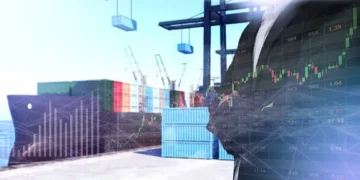The industrial manufacturing sector is navigating a dynamic landscape of logistics operations. Till Dengel, a leader in Logistics and Manufacturing Solution Management at SAP, offers insights into the current and future state of manufacturing logistics, providing guidance on building a flexible, robust, and environmentally conscious network.
Understanding Current Logistics Trends and Challenges
In the face of evolving logistics challenges, particularly those amplified by the COVID-19 pandemic, manufacturing companies are shifting priorities. Efficiency remains essential, but resilience has become equally important. Companies are now focused on enhancing foresight and adaptability to mitigate disruptions like supplier insolvency and border shutdowns. Transparency in the supply chain, especially concerning product origins and ethical sourcing, is another growing trend, along with an emphasis on sustainability efforts to reduce emissions and waste while promoting social equity.
Technological Evolution in Logistics Operations
Manufacturing logistics have evolved to emphasize resilience, transparency, and sustainability, alongside efficiency. Automation, including robotics, is a significant area of investment, aiding in tasks such as material handling and inventory management. Real-time tracking technologies are sought after for proactive disruption management and adherence to sustainability regulations. Additionally, data analytics provides insights into warehouse operations, enabling optimization and waste reduction.
SAP’s Role in Addressing Logistics Developments
SAP presents a suite of solutions to tackle the challenges of modern logistics. Their Warehouse Robotics solution, for example, enhances warehouse efficiency through automation. The SAP Business Network for Logistics offers connectivity among carriers and providers, facilitating collaboration. Various add-ons provide visibility and traceability, contributing to more transparent and sustainable supply chains.
The Value of SAP Business Network for Logistics in Compliance and Sustainability
The SAP Business Network for Logistics delivers value in compliance and sustainability. By utilizing SAP systems, businesses can track the origins and movements of goods, which is critical for meeting regulatory and ethical standards. The network’s capabilities in data aggregation and carbon emissions tracking support companies in maintaining responsible and auditable supply chains.
Conclusion
SAP’s industry cloud solutions are designed to help businesses adopt best practices for managing a logistics network that is not only agile and resilient but also committed to sustainability. These technological advances and strategies are vital for companies looking to thrive in the modern manufacturing landscape.
Discover the latest in supply chain logistics news on The Supply Chain Report. Free international trade tools are available at ADAMftd.com.
#IndustrialManufacturing #LogisticsOperations #SAP #LogisticsSolutions #SustainabilityInLogistics #SupplyChainTransparency #WarehouseAutomation #RoboticsInLogistics #ManufacturingLogistics #SustainableManufacturing #DataAnalyticsInLogistics #ResilientSupplyChains #SAPBusinessNetwork #SupplyChainCompliance #SupplyChainResilience #CarbonEmissionsTracking #CircularEconomy #FutureOfManufacturing #LogisticsInnovation #SustainableTech #LogisticsTrends #EthicalSourcing #ManufacturingEfficiency #LogisticsAutomation #SupplyChainVisibility #LogisticsTechnology














